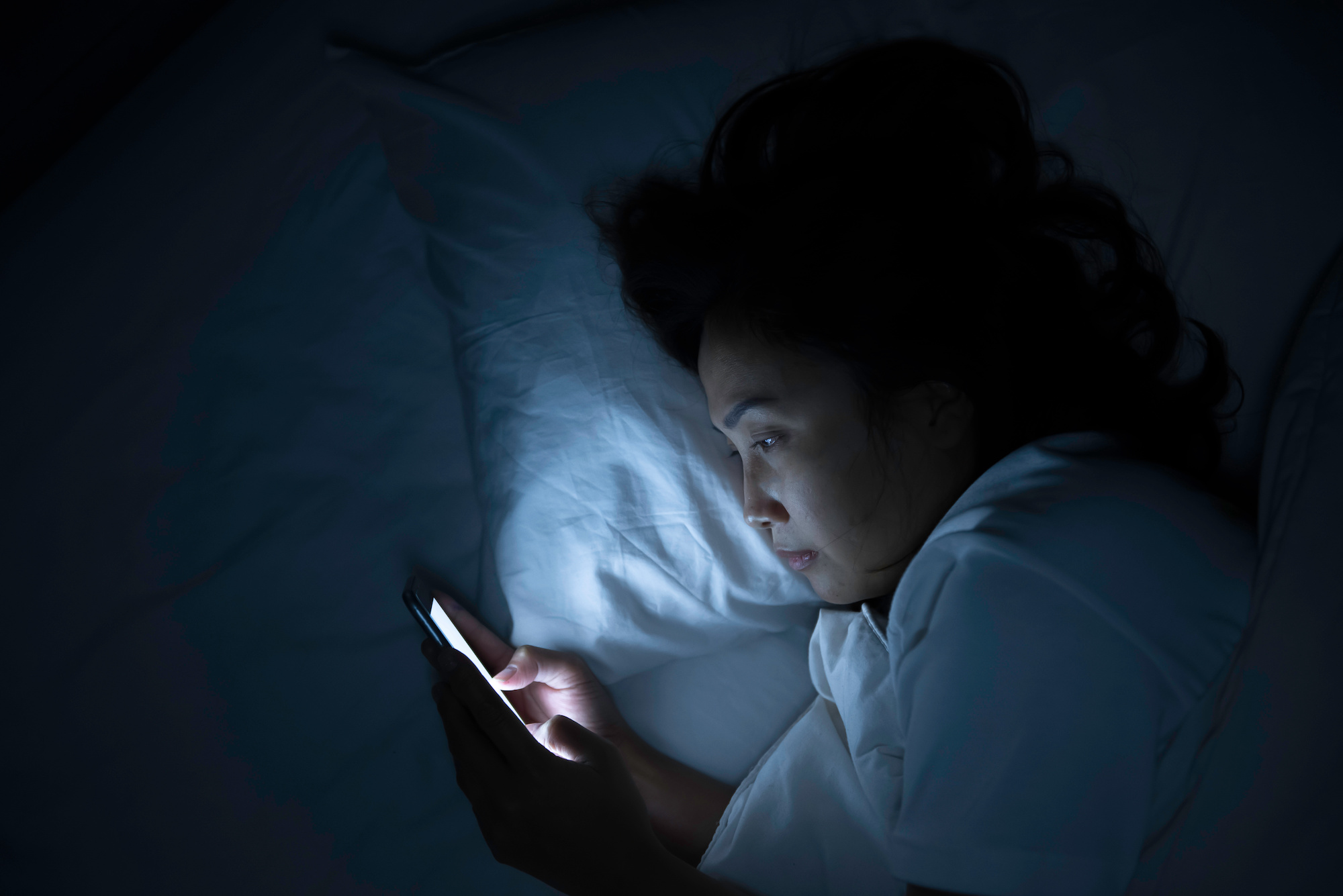Can you change from a night owl to an early bird? Here’s what sleep experts think
Oct 19, 2022, 10:00 AM

Woman plays with smartphone in bed at night, (CNN)
(CNN)
(CNN) — If your body and brain fail to rev up until later in the day, you’re likely a night owl, naturally programmed to enjoy staying up late and sleeping in past traditional school and work start times.
Yet getting up early to meet life’s responsibilities is the bleary-eyed reality of most late-to-bed types — leading many exhausted night owls to wonder: “Can I reprogram my biological clock to be an early riser?”
The answer for most night owls is “Yes, you can,” according to sleep experts. How successful you will be at changing your sleep preferences, however, may be dependent on your genes and your willpower.
“We can make you less of a night owl, but not completely, because the genetic tendency, or predisposition, is still there,” said Dr. Phyllis Zee, director of the Center for Circadian and Sleep Medicine at Northwestern University Feinberg School of Medicine in Illinois.
“It’s like if you have a gene for diabetes, right? You can modify that with your lifestyle, but it doesn’t change it,” Zee said.
Success is also dependent on how much you are willing to work to change behaviors that affect sleep, said Dr. Elizabeth Klerman, a professor of neurology in the division of sleep medicine at Harvard Medical School in Boston.
“Behavior change is very difficult. We can say what works, and then you have to decide if you want to do it,” Klerman said. “We don’t have a magic pill.”
Nocturnal health risks
Nature marries our sleep-wake cycle to the Earth’s rotation. Daylight enters your eyes, travels to your brain and suppresses the production of melatonin, a hormone that promotes sleep. When the sun goes down, your body clock turns melatonin production back on, triggering sleepiness within a few hours.
Your inherited sleep chronotype may alter that process. If you’re an innate early bird, your circadian rhythm releases melatonin earlier than the norm, energizing you to become more active in the morning. Night owls, however, secrete melatonin much later, pushing peak activity and alertness later into the afternoon and evening.
Your body clock also directs when you feel hunger, feel sluggish, and are peppy enough to exercise, so being a night owl may have a downside for your health. Studies have shown evening types are more likely to skip breakfast; eat more later in the day and use more tobacco, alcohol and caffeine. Night owls also have higher levels of visceral body fat in the abdominal region, a key risk factor for type 2 diabetes and heart disease.
Utah angle: Sleepless in Salt Lake City, Utah ranks #1 for people Googling “sleep issues”
Changing that genetic clock
While you might not be able to change your genetic predisposition, you don’t have to let it control you. Sleep experts have several techniques to alter your body clock if you’re willing to do them.
Let there be morning light: The first and most important change is to control the timing and type of light you see every morning, Zee said.
“The strongest reset for the circadian system is bright light,” Zee said, “Light in the morning changes the oscillation of your circadian clock genes at both a cellular and molecular level. You are also training all your rhythms, whether it’s sleep, blood pressure, heart rate or your cortisol rhythm to be earlier.”
Flood your eyes with light as soon as that pesky alarm goes off. Use natural sunlight if possible, or turn on artificial lights, especially those in the blue spectrum, which tells the body to wake up. Getting natural light in the winter isn’t easy, so some people use products that brighten slowly until the alarm sounds.
“Dawn simulators are fine,” Zee said. “The problem with these lights is that a lot of people don’t wake up to them or keep shutting them off. If you do that, then I suggest using light (therapy) goggles. Those are easier for many of my patients because you can put them on in bed, and then get up and walk around with these glasses while you are brushing your teeth and getting ready.”
Don’t stop there, Zee added. “Continue to extend brighter light intermittently throughout the entire morning.”
Go dark in the evenings
The flip side of the circadian reset is to turn down the lights at a much earlier time in the evening, especially blue light from electronic devices, which “only pushes your biological clock later,” Klerman said.
Yes, that means turning off your smartphone, laptop, gaming device and TV a lot earlier than you may want to. Before you run screaming for the exit, there are ways to tweak your device.
“You should put filters on your phone to change the color of your display. You can do that on your computer as well so the color is more in the amber or reddish orange range, which doesn’t suppress melatonin,” Zee said.
You can also download a free app called f.lux. It casts a yellow tint upon your screen so you get less blue light exposure, Klerman said.
You can’t turn off the blue light from your television, but you can turn off the TV. “Read a book or play a card game or whatever,” she said.
Eat and exercise earlier
Night owls naturally prefer to eat late, which has been shown to be associated with weight gain and higher obesity, Zee said.
“My rule: Stop eating within three hours of bedtime,” she said. “Because this genetic molecular clock exists in almost every cell of your body, that means it is in your fat and muscle cells, affecting your metabolism. That’s why feeding should be in sync.”
Exercise is critical for good sleep and overall health no matter what time you do it. However, if you’re a night owl, you should try to exercise in the morning or early afternoon, and avoid heavy exercise in the evening, Zee said: “Remember, everything should be in sync.”
Don’t turn to sleeping pills
You want to change your biological clock, not drug your body into sleep. Besides, “behavioral treatment of insomnia is more effective than drugs,” Klerman said.
If light isn’t working quickly enough, however, you can add melatonin about three hours before bedtime — and don’t take too much, Zee said.
“You will take a very low dose of melatonin — half a milligram. More is definitely not better to shift your clock,” she said.
“Very importantly, you have to be in the dark when you do this — you cannot be exposed to bright light during this period of time or using electronics because the blue light will suppress your endogenous melatonin,” Zee added.
The-CNN-Wire
™ & © 2022 Cable News Network, Inc., a Warner Bros. Discovery Company. All rights reserved.













